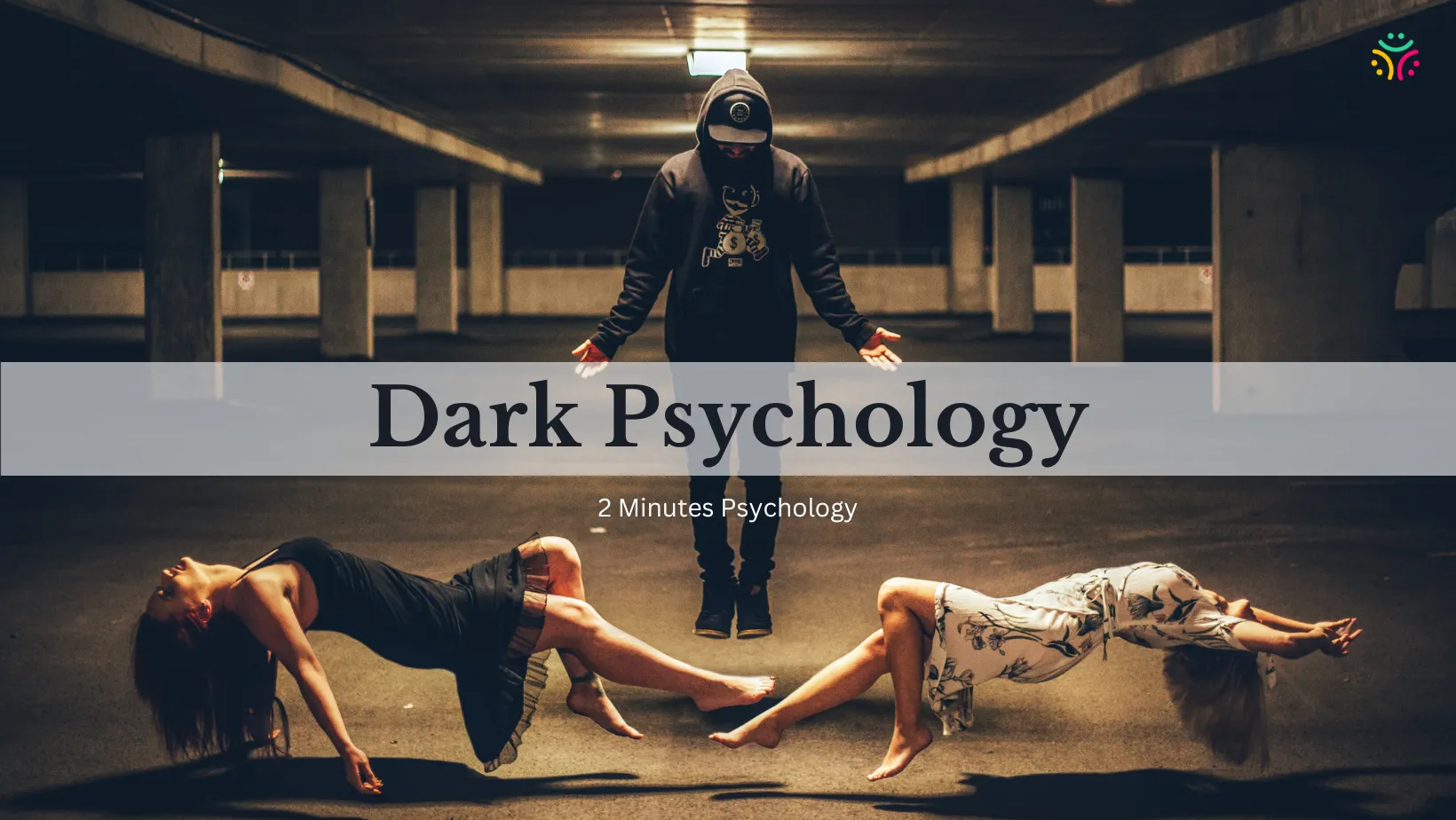Dark psychology encompasses the scientific study of the darker aspects of human behavior, including manipulation, deceit, persuasion, coercion, and control. It often investigates actions that are morally and ethically wrong, especially those aimed at exploiting or harming others.

Understanding Dark Psychology and Manipulation in Relationships

2 Minutes Psychology
Sep 10, 2025
Psychology, as a field, covers a wide array of topics, all seeking to elucidate the complexities of human behavior and the human mind. While much of this work focuses on positive elements like personal development, mental health, and wellbeing, there is also a darker side to psychology. This shadowy corner is the realm of 'dark psychology.' But what is it, and how does it manifest in our everyday lives?
What is Dark Psychology?
Dark psychology encompasses the scientific study of the darker aspects of human behavior, including manipulation, deceit, persuasion, coercion, and control. It often investigates actions that are morally and ethically wrong, especially those aimed at exploiting or harming others. This term is sometimes linked with studies on 'dark triad' personality traits, which comprise narcissism, Machiavellianism, and psychopathy.
The idea behind dark psychology is not to glorify these harmful behaviors but to understand them. By studying these destructive tendencies, psychologists hope to devise ways to recognize and protect against them.
Dark Psychology and Manipulation:
Manipulation is a key aspect of dark psychology. Manipulative behaviors may vary from subtle emotional manipulation to blatant and overt tactics. Such actions may include playing the victim, guilt-tripping, gaslighting, psychological bullying, or using fear as a control tactic.
A typical case of dark psychology and manipulation might involve a person in power, such as a boss, using their position to control or influence their subordinates unfairly. This could take the form of subtly threatening job security, playing favorites, or exploiting personal information for their own gain.
Manipulators often have a deep understanding of human emotions and use this knowledge to play with people's feelings and control their responses. This can cause severe emotional and psychological damage to the person on the receiving end of such tactics.
Dark Psychology Manipulation Techniques:
Gaslighting: Imagine if someone started questioning your memories, telling you that events you clearly remember never happened. That's gaslighting! It's like a magic trick designed to make you doubt your own mind.
Fear and Intimidation: This is like the bully in the playground threatening to take your lunch money. Instead of using their words, they use fear to get what they want. It's not a very nice way to play!
Guilt-Tripping: Have you ever had a friend who made you feel guilty anytime you couldn't hang out? They might say things like, "I guess I'll just stay home alone then." That's a classic guilt trip!
Love-Bombing and Devaluation: This is like getting a ton of compliments from someone one day, and then the next day, they start criticizing everything you do. It's confusing and often hurtful, like a roller coaster of emotions.
Misdirection and Distraction: Think of this like a magician who distracts you with one hand so you don't see what the other hand is doing. People using this technique might change the subject or do something dramatic to pull your focus away from what's really going on.
Information Control: Ever had a friend who kept you in the dark about things everyone else seemed to know? That's information control. It's like being the last one to hear the gossip, but on a more serious scale.
Exploitation of Trust and Affection: Imagine you have a friend who knows you'd do anything for them, and they use that to their advantage. It's like having a secret weapon they can use to get their way.
Constant Criticism or Negging: Picture a person who keeps making snide comments about you, but then acts like they're the only one who really gets you. It's like having a friend who keeps pointing out that you've got spinach in your teeth, but never offers you a mirror.
Dark Psychology and Gaslighting Manipulation:
One of the most well-known manipulative tactics related to dark psychology is 'gaslighting.' Gaslighting is a form of psychological abuse wherein a person makes someone else question their sanity, perception of reality, or memories. The term comes from a 1938 play (and later film) "Gaslight," in which a husband manipulates his wife into believing she's going insane.
Gaslighting can make a person second-guess themselves constantly, even questioning their own judgment or reality. It is a powerful tool in the arsenal of those who use dark psychological tactics, causing immense emotional distress and confusion to the victim.
An example of gaslighting might occur in a romantic relationship where one partner consistently questions the other's memory. For instance, they may deny promises made or events that took place, insisting that their partner is misremembering or overreacting. Over time, this can lead to the victim doubting their own memory or sanity.
Is Dark Psychology Real?
Yes, dark psychology is real. However, it is important to note that it isn't an officially recognized field within psychology as such but rather an umbrella term used to categorize specific harmful behaviors and tactics.
The reality of dark psychology can be seen in the frequent occurrence of manipulation and deceit in everyday life. For example, a con artist uses psychological manipulation to deceive their victims into handing over money or personal information. The tactics they employ, such as playing on a person's sympathies or fears, represent a practical application of dark psychology.
Many elements under the 'dark psychology' umbrella, such as manipulation, deceit, and abuse, are well-documented and widely studied phenomena within psychology. The concept is grounded in real behaviors and strategies that some people use to exert control over others, often for personal gain.
Is Dark Psychology Evil?
The term 'evil' is heavily value-laden, often associated with moral judgments rather than empirical science. In this context, it's crucial to remember that psychology as a discipline seeks to understand human behavior objectively without applying labels like 'good' or 'evil.'
Dark psychology studies behaviors and tendencies that are undoubtedly harmful and unethical, but labeling it as 'evil' could oversimplify the complex issues at hand. Instead, it is better seen as a tool to understand the harmful aspects of human behavior to prevent or mitigate their effects.
The label 'evil' is often subjective and can depend on cultural or personal values. However, the harmful impact of actions often associated with dark psychology is clear. For instance, a business leader who intentionally spreads false rumors to undermine competitors and boost their own status is not necessarily 'evil,' but their actions are certainly unethical and harmful.
Dark Psychology in Relationships
Dark psychology can manifest in relationships in numerous ways, such as emotional abuse, manipulation, gaslighting, or even physical violence. Abusers often use these tactics to control and exert power over their partners, creating a toxic environment.
In a personal relationship, one partner may use emotional manipulation to control the other. For example, they may consistently belittle their partner's feelings, tell them they're overreacting or too sensitive, or make them feel guilty for expressing their needs. This creates a power imbalance in the relationship and can lead to emotional damage.
In such cases, the victim often feels trapped, powerless, or confused, doubting their own experiences due to the manipulator's tactics. Understanding the signs of dark psychology can help individuals recognize such harmful behaviors in their relationships and seek help.
Dark Psychology Facts:
- Dark psychology is linked with the 'dark triad' of personality traits: narcissism, Machiavellianism, and psychopathy. People with these traits often show tendencies for manipulation, deceit, and a lack of empathy. The facts around dark psychology demonstrate its relevance in understanding harmful human behavior. For example, a person displaying traits of the 'dark triad' may regularly demonstrate manipulative behavior. They may display a sense of entitlement (narcissism), deceive others for personal gain (Machiavellianism), and show little remorse for their actions (psychopathy).
- Dark psychology isn't 'evil' per se, but it encompasses behaviors that are harmful and unethical.
- Dark psychological tactics such as gaslighting can make people question their own perception of reality.
- Dark psychology is not a formally recognized field within psychology, but it represents a collection of harmful behaviors that are widely studied.
In conclusion, dark psychology serves as a reminder of the complexities of human behavior. It highlights the necessity of understanding and recognizing manipulative and destructive behaviors to protect individuals and society from their effects. It's a dark field, but one that can shed light on the safeguards we need to implement for a healthier, safer society.
Join psychology Community Let's Meet for more updates
Community
Share your experience
Let's Meet 2 Minutes Psychology
Aug 28
Remember
Let's Meet 2 Minutes Psychology
Aug 28
Cognitive Behavioral Therapy (CBT) and anxiety coping skills
Let's Meet 2 Minutes Psychology
Aug 28
Anxiety coping skills for teens
Let's Meet 2 Minutes Psychology
Aug 28
Grounding techniques
Let's Meet 2 Minutes Psychology
Aug 28
Related Posts
Categories
FREQUENTLY ASKED QUESTIONS
What is Dark Psychology?
Is Dark Psychology Evil?
Dark psychology studies behaviors and tendencies that are undoubtedly harmful and unethical, but labeling it as 'evil' could oversimplify the complex issues.
Dark psychology Vs Manipulation
This is like a big umbrella that covers all the sneaky, harmful, and sometimes hidden ways people might behave. It's about understanding why some people might lie, cheat, or try to control others. It's like trying to figure out the "dark side" of human behavior. Whereas, imagine someone trying to get you to do something by playing with your emotions or tricking you. That's manipulation. It's a specific way someone might try to control or influence you without you realizing it. It's like a puppet master pulling the strings without the puppet knowing.
How people use Dark Psychology in Relationship?
In a personal relationship, one partner may use emotional manipulation to control the other. For example, they may consistently belittle their partner's feelings, tell them they're overreacting or too sensitive, or make them feel guilty for expressing their needs. This creates a power imbalance in the relationship and can lead to emotional damage.
.png)

